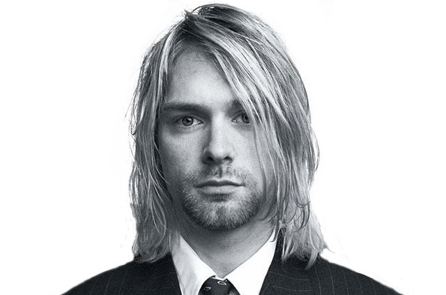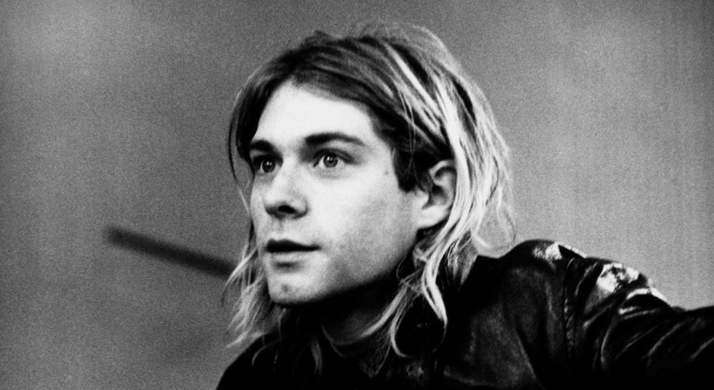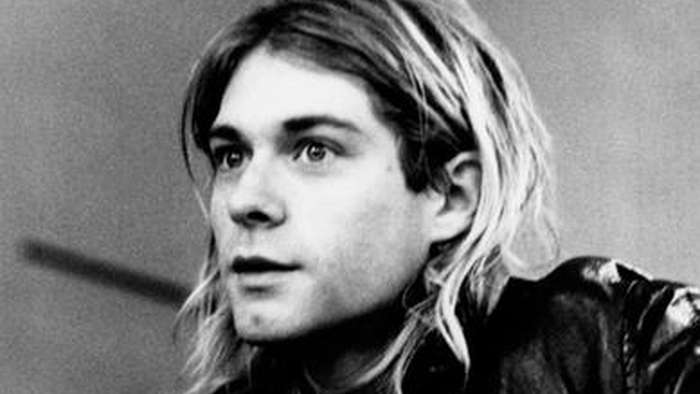It's strange that, while numerous memories have vanished from my mind over the years, I can still remember where I was when I learned of the death of Kurt Cobain: in a school bus, rounding the loop outside an elementary school in south-central Pennsylvania. Probably the strangest thing about remembering these particulars is that I was never a huge fan of Nirvana–-not at the time for sure and only moderately since-–yet the passing of a man regarded as the voice of a “disaffected” generation was big news. In 1994, it was near impossible not to be exposed to a flood of information about Cobain's death and, in the years since, a process of deification has only further cemented his legacy as a martyr for rock 'n' roll.
2015 was about as banner a year for Cobain as could be imagined for a man dead for over two decades: aside from the (unofficial) release of the early Fecal Matter demo that represented the earliest Cobain recording available to the public, fans also saw the release of Brett Morgan's documentary Kurt Cobain: Montage of Heck and its accompanying home-recorded soundtrack. Morgan's film is notably different from any of the previous Cobain-related films in that it's the first one authorized by the Cobain family and the Nirvana estate, meaning actual Nirvana music is featured in the film. As outstanding as the documentary is in terms of its construction, it's easily this element that ensures it works. I find Nirvana to be somewhat overrated as a band, but listening to their music does reaffirm for the viewer that Kurt Cobain was something special and that all the fuss surrounding him was justified, at least to a certain extent.
Presenting a well-rounded view of Cobain's life and music career through careful use of archival footage (including lots of home movies) and interview segments, Montage of Heck also goes a long way in trying to explain the musician's mindset by examining his journals and writing. Magnificently edited, with eye-catching animation bringing the doodles and text in the journals to life, the innovative film's title seems appropriate since a viewer is plunged into Cobain's disorienting world, one sporadically beset with themes of paranoia and insecurity. The film certainly doesn't shy away from depicting the darkness gradually creeping into Cobain's life and is downright uncomfortable in its portrayal of he and wife Courtney Love as the ultimate (self-proclaimed) junkie rock couple, yet I can absolutely understand criticism the piece has received from the likes of The Melvins' Buzz Osborne, a longtime friend of Cobain who declared that “90 percent of Montage of Heck is bullshit.”

Films portraying Kurt Cobain and/or Nirvana have almost always been met with controversy: such seems to be the nature of dealing with a near-mythical figure and legendary band. An analysis of the history of Cobain-related cinema reveals a series of productions as problematic as they are fascinating. Certainly, to mainstream audiences, Montage of Heck may be the final word and conclusive filmed representation of Kurt Cobain, but it's crucial to understand something of the previous Cobain documentaries to uncover and understand some of the so-called “bullshit” present in Morgan's film.
To a large extent, the history of Cobain on film has less to do with how Kurt is represented and more with how Courtney is. Universally accepted as a flawed but supremely talented genius, there's not much more about Kurt that can be said, yet the portrayal of Courtney varies wildly from film to film. Sometimes, as was the case with 2006's arty and hypnotic yet only moderately satisfying documentary Kurt Cobain: About a Son (which presented ongoing interviews with Kurt conducted in late 1992/early 1993 over collage-like visuals) and 2005's Last Days (a slow-moving, fictionalized recreation of the days leading to Cobain's suicide), Courtney is largely ignored–-perhaps because the producers (rightfully?) simply didn't want the hassle of trying to negotiate and deal with her. More often, she jumped into the spotlight at every opportunity, first appearing in the 1992 tour document 1991: The Year Punk Broke which chronicled a European tour that billed Nirvana as support for Sonic Youth.
"Courtney is largely ignored–-perhaps because the producers (rightfully?) simply didn't want the hassle of trying to negotiate and deal with her."
Nick Broomfield's 1998 Kurt & Courtney shaped the way future productions tackling the Cobain story would operate. Initially attempting to explain the Cobain allure, Broomfield's interview with Kurt's aunt Mari details the musician's childhood and initial forays into recording, but the film quickly changes gears to document how powerful forces in the music industry don't want the Cobain story to be told in any manner except the established one: i.e. the one in which a depressed and neurotic Kurt commits suicide in 1994. Several interviews with Hank Harrison, Courtney's estranged father, illustrate troubling aspects of her personality including her propensity towards violent outbursts--aspects which are confirmed by the director's own (onscreen) dealings with Love as well as comments provided by other journalists and friends. The film's most disturbing moment occurs when El Duce, the notorious, admittedly “warped [and] intoxicated” singer for infamous "rape rock" band The Mentors, reveals that he was offered $50,000 by Love to “whack” her husband, going so far as to identify the guy who did perform the murder as someone named “Alan.”
Though the director admits that the conspiracy theories discussed don't do much for him, the fact that Broomfield's film was all but ruined when various financiers were threatened by Courtney seems to indicate that there were inconvenient aspects of the investigation that she simply didn't want to get out. These “inconvenient aspects” were again put front and center in Benjamin Statler's 2015 docudrama Soaked in Bleach, which reiterates many of Broomfield's points but focuses more explicitly on the investigation conducted by former police detective Tom Grant. Hired by Courtney to find her husband after he escaped from a drug rehab facility just days before his death, Grant uncovered evidence that, in his mind, established that Courtney had knowledge of Kurt's death-–a death that Grant believed was a homicide--that she hadn't made public and may even have been involved in the murder.

Again, Courtney is made out in this film to be manipulative and conniving, and Grant provides evidence of her somewhat nefarious behavior in the form of original audio tapes and phone recordings where Love is heard pondering the ways in which she can “spin” the situation to her own benefit. Persuasive as it is, Statler's film is undeniably subjective and suffers from a lack of hard, irrefutable evidence; two decades after Cobain's death, talking heads only do so much and any investigation into the (admittedly, suspicious) way in which the man died demands a re-opening of the original case files and an independent review of the police reports. This information is still not available to the public and the sheer amount of contradictory information out there has made the truth ever more elusive.
Whether one believes it or not, the conspiracy that ties Courtney to her husband's death is nothing if not intriguing: if information detailed by Statler and Broomfield is to be believed, Cobain was contemplating divorce just prior to his death; had that separation been finalized, Love would have received significantly less income from his estate. As it turned out, her controlling share in Nirvana (aside from causing a long-standing feud with band members Krist Novoselic and Dave Grohl) would provide Love with a steady stream of income for years to come. Conspiracy theories also gain some traction when one realizes that Hole's Live Through This was released the very week of Cobain's death: about as striking and strange a coincidence as could be imagined. This album virtually sealed Love's career as a musician in her own right, becoming a massive commercial and critical success. It's also interesting that in the years immediately following her husband's death (and around the same time that Broomfield was making his documentary), Courtney was flirting with mainstream Hollywood success, delivering a well-received performance in 1998's The People vs. Larry Flynt and achieving some semblance of the fame she had long sought. All things considered, it's very hard to deny the fact that no one profited from Cobain's death quite like his widow did.
Courtney Love's less than enthusiastic, and often downright hostile, attitude towards both Kurt & Courtney and Soaked in Bleach is understandable: both these films take an almost aggressively anti-Courtney approach to the point that they almost make her seem like the devil who pulled Kurt down. The fact that Courtney figures prominently in--and at times, starts to dominate--Montage of Heck is probably one of that film's major problems. On some level, Courtney has been steering the Kurt Cobain ship for more than two decades in an effort to further her own career and keep getting paid. Her cooperation with a film in 2015 seems less determined by her desire to get the story out there and be truthful about it than one to reaffirm Cobain's place among the “gods of rock.” It's certainly no coincidence that Montage makes very little reference to Kurt's death, mentioning his suicide only on a title card that precedes the end credits. I also found it a bit unnerving that, leading up to this denouement, the film's editing subtly progresses the (unfounded?) idea that Kurt was suicidal and beginning to lose a grip on reality in early 1994. Again, it seems like Morgan's film is walking the straight and narrow. This was the only way Courtney (and likely, the Nirvana estate) would have agreed to cooperate in the making of the film.
"At various points in his life, Kurt despised being famous and was embarrassed by the way he was treated by the media"
I was left with a sense after perusing this batch of documentaries that, while Kurt absolutely deserved his fame due to his talents as a songwriter and musician, Courtney sort of coat-tailed her way to success due to a series of rather unsavory circumstances. It's sad to realize that this fame probably ruined both of them in different ways. At various points in his life, Kurt despised being famous and was embarrassed by the way he was treated by the media: it strikes me as likely that issues with not being able to handle the celebrity lifestyle that his talents had bred led to his breakdown and eventual demise. Though she's achieved recognition in popular culture, Courtney has had her own personal demons over the last decade and a half: flaps with the likes of Miley Cyrus and Lindsay Lohan (to say nothing of a jaw-dropping exchange with Lana Del Rey) seem rather obvious, pathetic attempts to stay relevant-–and occasionally ironic coming from someone who has herself sometimes seemed to be a celebrity trainwreck.
At one point during About a Son, Cobain is heard imagining what the world will be like in twenty years, declaring that “when rock 'n' roll is dead, the whole world's going to explode.” It's tempting to think about what Cobain would have to say about today's music industry and world as a whole. Things have changed dramatically over the past two-plus decades and it sometimes seems as though the world will indeed explode, but it's also worth wondering how the world would view Kurt Cobain had he lived past 1994. Neil Young had it right: a nearly fifty-year-old Cobain wouldn't be the same, glamorized figure idolized by a generation. Much as music fans can lament what might have been after an untimely death, we should more be glad that Kurt Cobain did get a chance to entertain us for a while.







